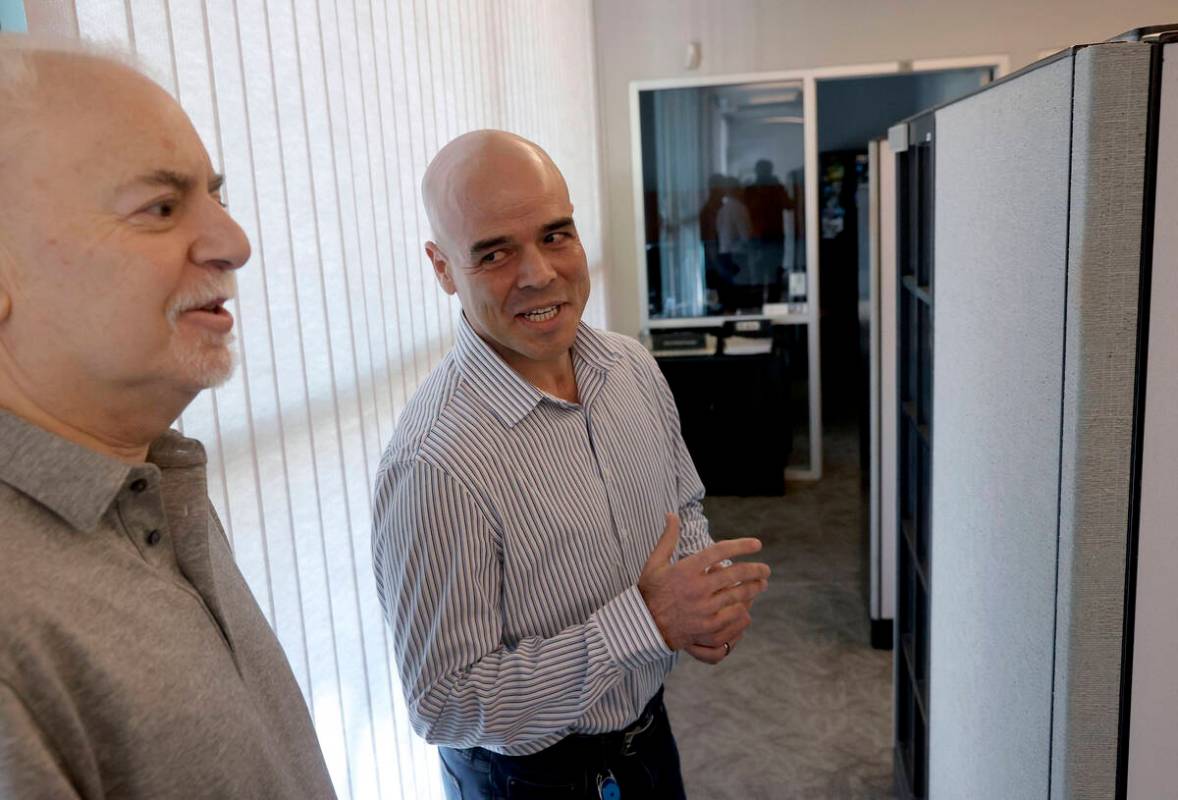RJ seeks restraining order to stop search of slain reporter’s devices

The Las Vegas Review-Journal sought an emergency restraining order on Tuesday to preclude authorities from immediately searching the personal devices of slain investigative reporter Jeff German.
Review-Journal Executive Editor Glenn Cook said the step is intended to protect the identities of German’s confidential sources and the information they provided him.
“The Review-Journal has been advised by the Government that they are taking the position they may proceed with searching the devices if the parties do not otherwise reach agreement by 5:00 p.m. today, which they have been unable to do,” the newspaper’s motion states.
The newspaper also filed a motion Tuesday demanding that a third party help review German’s devices, and that his information be returned to the Review-Journal following the review process. Both motions were filed in District Court.
Review-Journal lawyers argue that Metro’s seizure of German’s devices violated both Nevada’s shield law, which is designed to protect journalists, and the federal Privacy Protection Act, meant to prevent the unlawful searches of journalists.
“Government officials would never be allowed to seize and search the cellphone and computers of a working, living journalist,” Cook said. “Now we are confronted with the assertion that because a journalist has been murdered, this seizure and search, without restriction, is lawful and appropriate. This cannot be allowed, so we are seeking relief from the courts to make sure it doesn’t happen.”
The newspaper is being represented by attorneys Joel Tasca, Ashley Kissinger, Kennison Lay, David Chesnoff and Richard Schonfeld.
German, 69, was found dead of stab wounds last month outside his Las Vegas home. Clark County Public Administrator Robert Telles, who was the subject of German’s reporting, is accused of killing the veteran journalist.
Police seized personal electronic devices that the news organization believes German used for work, including a cellphone, hard drive and multiple computers. Prosecutors and the public defender’s office now want to search those devices in connection with Telles’ criminal case.
“Authorities have said Jeff German was murdered for doing his job,” Cook said. “Now those same authorities want to set aside the privileges and protections that allowed Jeff to do his job, which would expose the identities of confidential sources who helped Jeff do his job.”
Clark County District Attorney Steve Wolfson and Metropolitan Police Department attorney Matthew Christian did not immediately reply to requests for comment Tuesday evening. Telles’ public defender, Edward Kane, declined to comment.
‘Irreparable travesty’
The Review-Journal previously filed a motion in Las Vegas Justice Court to prevent authorities from searching the devices, but Justice of the Peace Karen Bennett-Haron said she did not have jurisdiction to hear the motion.
Last week, the Reporters Committee for Freedom of the Press and 43 other media organizations asked to file a friend-of-the-court brief in support of the Review-Journal’s motion in Justice Court.
“The murder of a journalist is an outrage, but it would be an absolute and irreparable travesty if that murder forever weakened press rights and freedoms in Nevada,” Cook said.
In an opposition to the newspaper’s previous motion, Metro argued that “a Defendant’s constitutional rights take precedence over any reporter’s rights.”
Metro previously told the newspaper in writing that the department did not intend to search the devices “until a protocol can be approved by the judge,” and prosecutors also agreed that they would not seek to review the material without a judge’s permission. Officials later asserted that they could search the devices as early as Tuesday evening, according to the motion for a restraining order.
“Absent immediate injunctive relief, these government entities may move forward to access and review these confidential, unpublished materials, which likely include information about confidential sources, causing irreparable harm to the Review-Journal, potential sources, and the general public,” the filing states.
Special master sought
Metro should not be allowed to “further violate” the Privacy Protection Act by searching the devices or allowing attorneys to search the devices, the newspaper’s lawyers wrote in the motion.
“Indeed, even if Mr. German was a criminal suspect and police had probable cause to believe that his devices contained evidence of a crime he committed, police still could not search the PPA-protected materials,” the motion states. “… If Metro cannot search PPA-protected materials residing on the device of a criminal suspect, they certainly cannot search PPA-protected materials residing on the device of a journalist who is a crime victim.”
The newspaper is asking for a special master from outside Las Vegas’ state and federal judicial systems to oversee a review of German’s devices to determine what information could be turned over to officials.
Review-Journal lawyers argue that German’s devices may contain information on confidential sources from his career spanning more than 40 years, many of whom could be associated with Nevada’s law enforcement and government agencies.
German’s devices are likely to contain information on confidential sources from within the Clark County public administrator’s office who spoke to German, and who could face professional retaliation, according to the motion.
Multiple sources have told the Review-Journal that confidential sources from within the office “are very concerned about this situation since Telles could potentially be let out on bail or acquitted,” the motion states.
Contact Katelyn Newberg at knewberg@reviewjournal.com or 702-383-0240. Follow @k_newberg on Twitter.